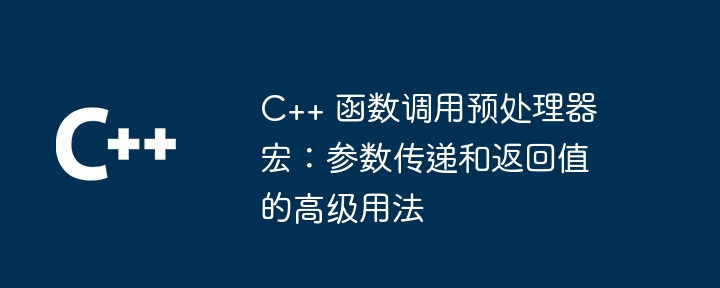
In C, preprocessor macros can be used to call functions, involving the following steps: Parameter passing: Macro parameters are enclosed in parentheses and separated by commas. Return value: Use macro parameters to specify the value to be returned and assign it to a variable. Practical case: By using macro optimization to find the function of the maximum value index in the array, the number of calculations is reduced and the efficiency is improved.

C Function Call Preprocessor Macro: Advanced Parameter Passing and Return Value
In C, the preprocessor Macros are a powerful tool that can be used to perform text replacement at compile time. Although macros are often used to define constants or simplify conditional statements, they also play an important role in function calls. This article will introduce how to use preprocessor macros to call functions, and delve into parameter passing and return value processing.
Parameter passing
Parameter passing in macro calls is similar to ordinary function calls. The parameter list in a macro is enclosed in parentheses and separated by commas. For example, the following macro defines a simple sum function:
#define SUM(a, b) (a + b)
When using this macro, simply replace the actual parameters with the macro parameters:
int result = SUM(3, 5); // result 为 8
Return value
Macros can also be used to simulate function return values. Although macros themselves have no return type, we can use techniques to control the results of macro calls. A common approach is to use a macro argument to specify the value to be returned:
#define MAX(a, b) ((a) > (b) ? (a) : (b))
This macro defines MAX, which returns the larger of the two arguments. When using it, we specify the actual parameters for the macro parameters and assign them to a variable: Practical examples of macros. Suppose we have a function that takes an array of integers and returns the index of the maximum value in the array:
int max_value = MAX(10, 15); // max_value 为 15
This function is inefficient because max_index must be recalculated each time it is iterated over the array. We can use preprocessor macros to optimize it: int find_max_index(int arr[], int size) {
int max_index = -1;
for (int i = 0; i < size; ++i) {
if (arr[i] > arr[max_index]) {
max_index = i;
}
}
return max_index;
}
#define MAX_INDEX(arr, size) \
int max_index = -1; \
for (int i = 0; i < size; ++i) { \
if (arr[i] > arr[max_index]) { \
max_index = i; \
} \
} \
return max_index;The optimized function will return 2, representing the index of the maximum value 5 in the array. It is more efficient than the original function because it reduces the number of calculations.
ConclusionPreprocessor macros provide powerful flexibility in C function calls, allowing us to control parameter passing and return values. By understanding its high-level usage, we can optimize our code to make it more efficient and easier to maintain.
The above is the detailed content of C++ function call preprocessor macros: advanced usage of parameter passing and return values. For more information, please follow other related articles on the PHP Chinese website!
 What are the differences between c++ and c language
What are the differences between c++ and c language
 Recommended learning order for c++ and python
Recommended learning order for c++ and python
 Cost-effectiveness analysis of learning python and c++
Cost-effectiveness analysis of learning python and c++
 Is c language the same as c++?
Is c language the same as c++?
 Which is better to learn first, c language or c++?
Which is better to learn first, c language or c++?
 The difference and connection between c language and c++
The difference and connection between c language and c++
 C++ software Chinese change tutorial
C++ software Chinese change tutorial
 Cost-effectiveness analysis of learning python, java and c++
Cost-effectiveness analysis of learning python, java and c++




